Luke 1:1-4: Luke Destroys Doubts and Deflates Dodgy Doctrine
In Luke 1:1-4 (commonly referred to as Luke’s prologue), Luke is already Destroying Doubts. And Deflating Dodgy Doctrine!
We live in a world today where so many people,
want you to doubt your faith as a Christian.
The funny thing about this is, many people want you to believe a relationship with God is only based on where you were born,
or based on your bloodline.
The Gospel of Luke Destroys Doubt
In this post, I’m going to show you how Luke totally destroys, many different things you might hear today from different groups.
This will be based on the first four verses in Luke’s Gospel account (the prologue).
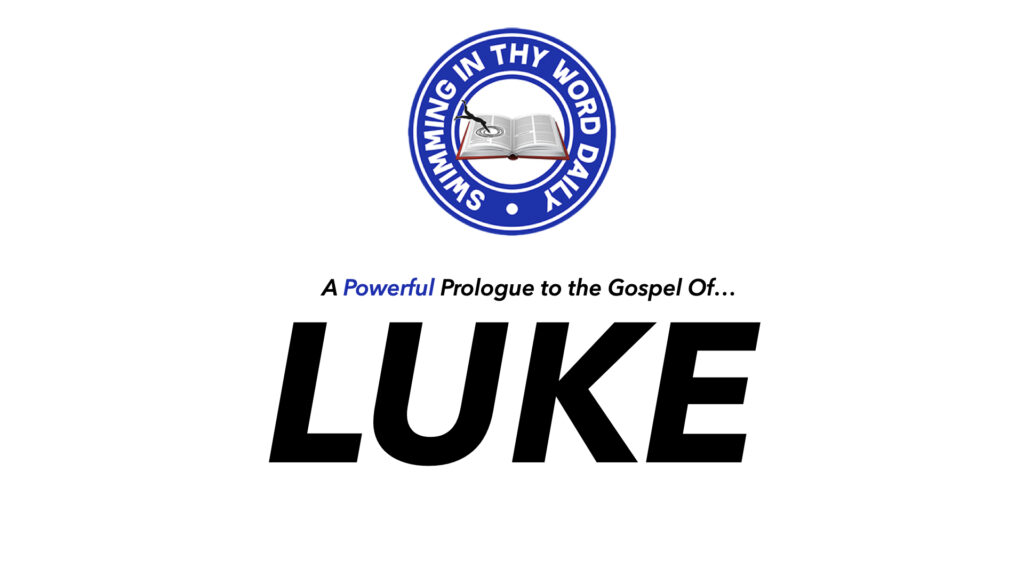
It will give you the confidence to excel as a Christian.
Today’s post is a titled The powerful prologue to the Gospel of Luke!
In our second session
in Luke’s Gospel account
we’re going to see this is a powerful prologue.
We will focus on two things.
We’re going to go on a journey.
Today I’m going to take you through what I’m calling,
The 5d’s
Destroy Doubts. Deflate Dodgy Doctrine!
They are easy to remember,
and will help you easily digest today’s post.
This will be a blessing, not only for you today,
but also for the rest of your life as you go forward.
The Seeds of Doubt
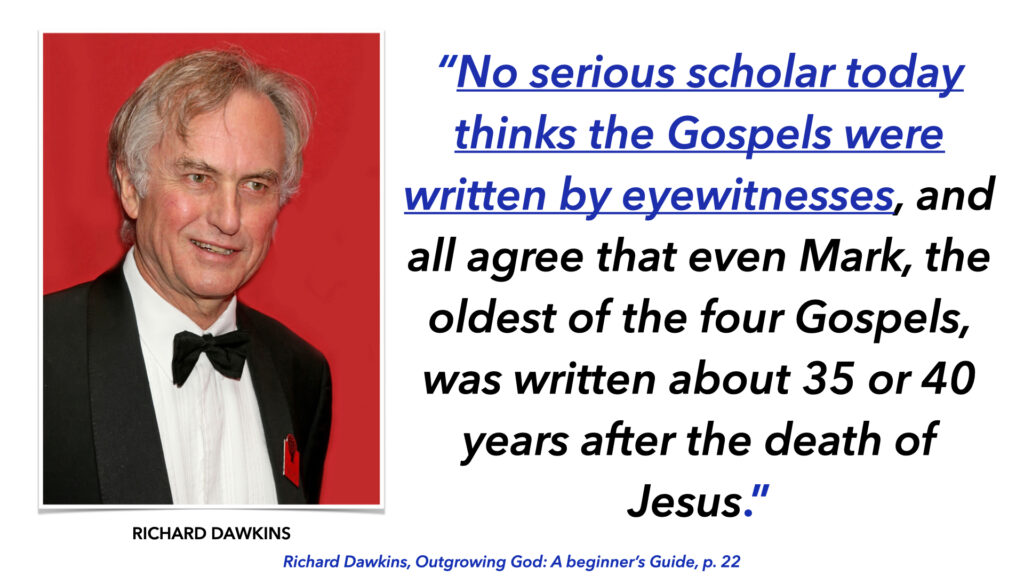
In his book Outgrowing God [1]Richard Dawkins. Outgrowing God. Pg. 22, popular atheist Richard Dawkins talks about how,
“No serious scholar today thinks the Gospels are written by eyewitnesses“.
And he says,
“all agree that even Mark, the oldest of the four Gospels, was written about 35 or 40 years after the death of Jesus“.
The fact is, when you read books like this,
or when you hear things like this,
this is not going to breed confidence,
or courage in regard to your faith is it?
But Luke’s prologue, is already dealing with, and setting you up to destroy the doubts people try to present to you today.

You have people trying to get you to live in this sort of malaise.
A false dichotomy is created. God vs Reason, Logic & Truth!
Your heart is for God, you’ve got a passion for God, but you can’t logically believe God is actually true.
Luke’s Gospel account, in the first four verses,
are going to help you see,
you can be passionate about the things you believe about God,
and your mind doesn’t have to wonder.
Your mind doesn’t have to do backflips, or tricks
to deceive your heart,
or to deceive yourself,
in order to believe in the faith you hold to!
Deal with Doubts

In this post, we’re going to deal with doubts
We’re also going to be,
Deflating Dodgy Doctrine!
Some of the most popular online groups
which are commonly called black Hebrew-Israelites.
They don’t all teach what I’m about to share with you next,
but it does seem like, the most popular groups,
the ones you may see online all over the place,
the ones you may see on street corners,
are the ones who will teach this,
Israelite-Only exclusive doctrine.
They teach only they can have a relationship with God.
In this post, I’m going to show you
not only is Luke’s prologue,
going to deal with doubts,
it’s also going to show you how it deflates dodgy doctrine
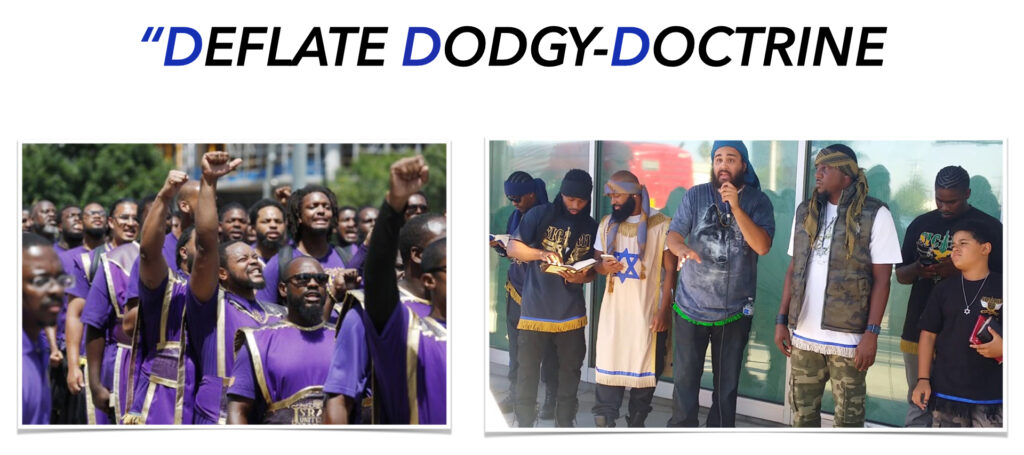
You have people who preach boldly from street corners
stuff like you can only have a relationship with God
if you’re an Israelite!
You can only preach,
you can only speak God’s word,
if you come from a specific bloodline.
And Luke is already dismantling this sort of false doctrine.
In the first part,
I presented to you
what I call the seven P’s.
We’re going to continue to go back to them, over and over again.
This will build clarity for you, as we work through Luke’s Gospel account verse by verse.
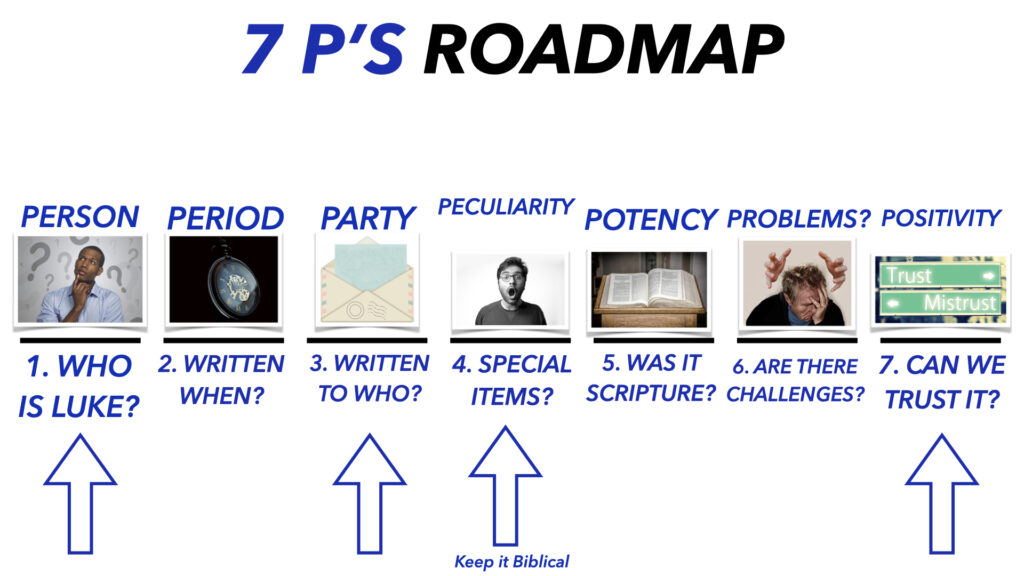
In this post, we’re going to hone in specifically on four.
We’re going to look at the first p.
The person.
Who is Luke?
That’s going to come up in today’s article.
We’re going to look at the third p.
The party.
Who was Luke writing to?
We’re going to look at the fourth p.
The peculiarities.
What’s special about Luke’s Gospel account?
And we’re going to look at the seventh p.
The positivity.
What about the first four verses give you grounds to trust
and deal with doubts, people like Richard Dawkins (and people even in some Christian camps) hold to?
Before we even get into the scripture,
I want to start with this man here,
Sir. William Ramsay.
Because I think it would be a great way to set this scene for you.
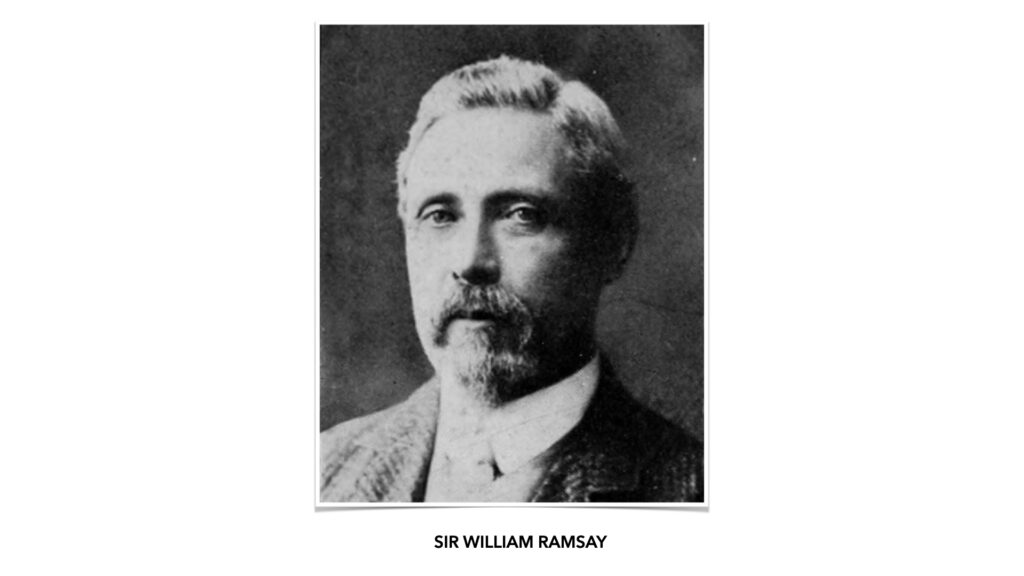
William Ramsay was a famous person in history
and he was an atheist!
And if you think what I showed you
about Richard Dawkins a moment ago
was significant in his book Outgrowing God,
William Ramsay could definitely give Richard Dawkins
a run for his money.
Comments by Confident Atheists
These are the forbearers’ of people like Richard Dawkins, who didn’t believe in the Gospel.
Notice what he says when speaking about Luke’s Gospel account.
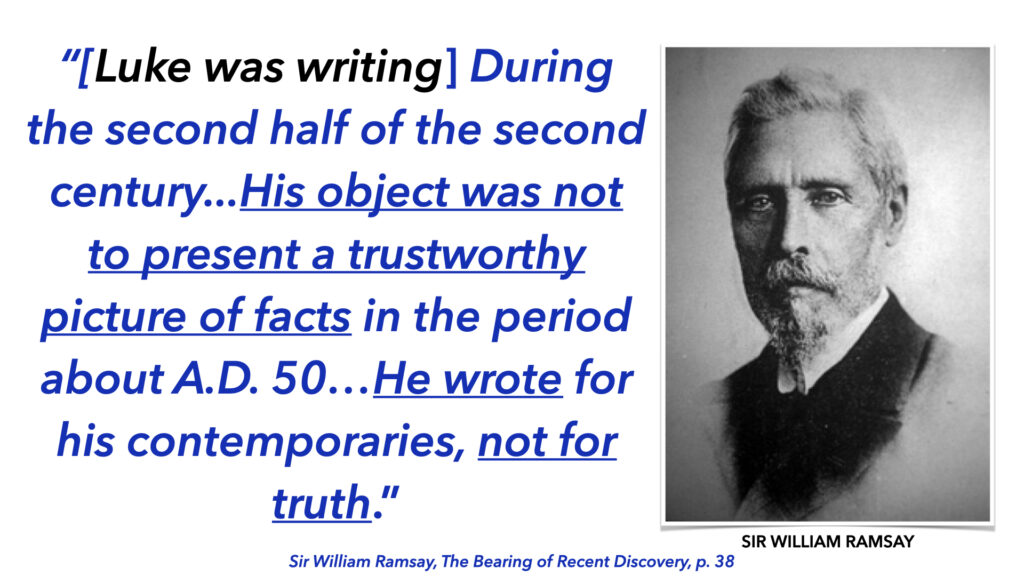
“[Luke was writing] during the second half of the second century, his object was not to present a trustworthy picture of facts in the period about 50AD”[2]Sir William Ramsay. The Bearing of recent discovery. Pg. 38
He says, “he wrote for his contemporaries not for truth“.
So in this book,
William Ramsey is speaking about how
Luke was written about 120-170 years after the time of Christ’s crucifixion.
What Sir William Ramsay did next
was something I think
was so golden.
It was so interesting.
He was so confident about the things I’m showing you here, he did something not many people do.
He set off from Britain,
and said I’m going to debunk Luke.
And Debunk the Bible as a whole.
So he travelled over from Britain,
went to what we call today the region of Turkey.
He went to different places Luke spoke about in his writings
(specifically the book of Acts).
And he travelled to these different places,
he read about the places & people Luke spoke about
in order to debunk it.
The funny thing about what this atheist did is,
as he progressed through this particular journey
he returned to Britain a believer in Christ!
GLORY TO GOD!
Think about what he said in the first quote I showed you.
He went from that sort of thinking,
to talking about Luke and saying things along the lines of:[3]Ibid. Pg. 89
You may press the words of Luke in a degree beyond any other historians
and they stand the the keenest scrutiny
and the hardest treatment, provided
always that the critic knows the subject
and does not go beyond the limits of science and justice.
So this man, who started off as a staunch atheist,
somebody akin to Richard Dawkins,
he leaned into that belief and went to study these things out
to debunk Luke,
and show Luke was inaccurate,
and he wound up a believer,
realizing Luke was on another level.
Luke – A Historian?
He talked about Luke as a historian,
and I wanted to share this with you,
before we get into the first four verses,
because it really sets the scene
for what we’re talking about here.
So, as we read through the four verses for today’s post,
I want you to think about,
what Luke actually says,
to start his Gospel account.
What he doesn’t say?
And we’re going to come back and discuss it.
Let’s read through the first four verses.
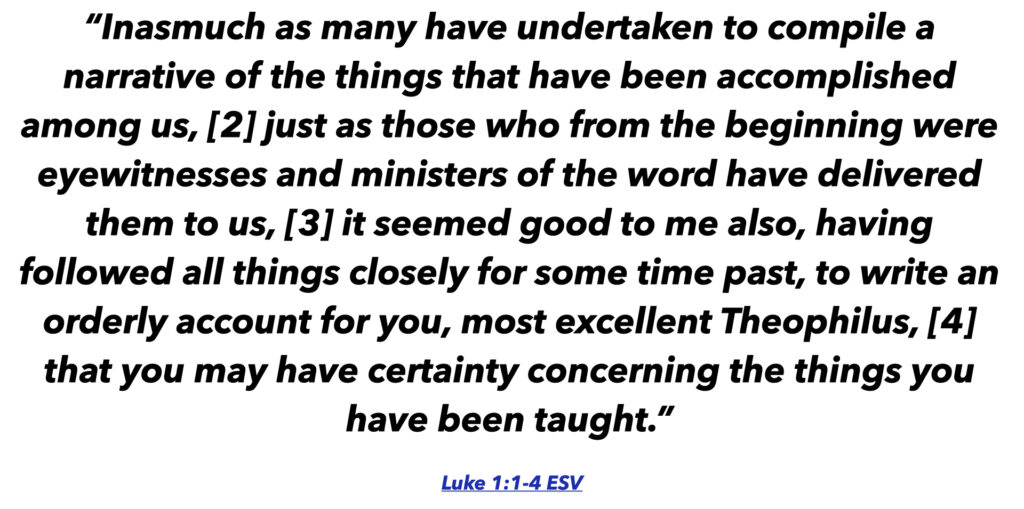
“In as much as many have undertaken to compile a narrative of the things that have been accomplished among us, just as those who from the beginning were eyewitnesses and ministers of the word have delivered them to us, it seemed good to me also, having followed all things closely for some time past, to write an orderly account for you, most excellent Theophilus, that you may have certainty concerning the things you have been taught.”
As we go through those four verses
digest those verses,
and don’t just read them.
Think about what Luke is actually saying,
what Luke is presenting to the reader,
to you to me.
What does Luke want you to do with what he’s saying?
Think about those sorts of things,
and we’ll come back to this in a moment.
Another thing you could do when reading scripture is
to read it in a different translation.
Reading it in a different translation
can give you a diverse angle,
and show you subtleties that you may miss.
So, before we start breaking down these verses,
let’s just read the verses again,
but from a different translation.
And see if you pick up anything different or anything deeper.
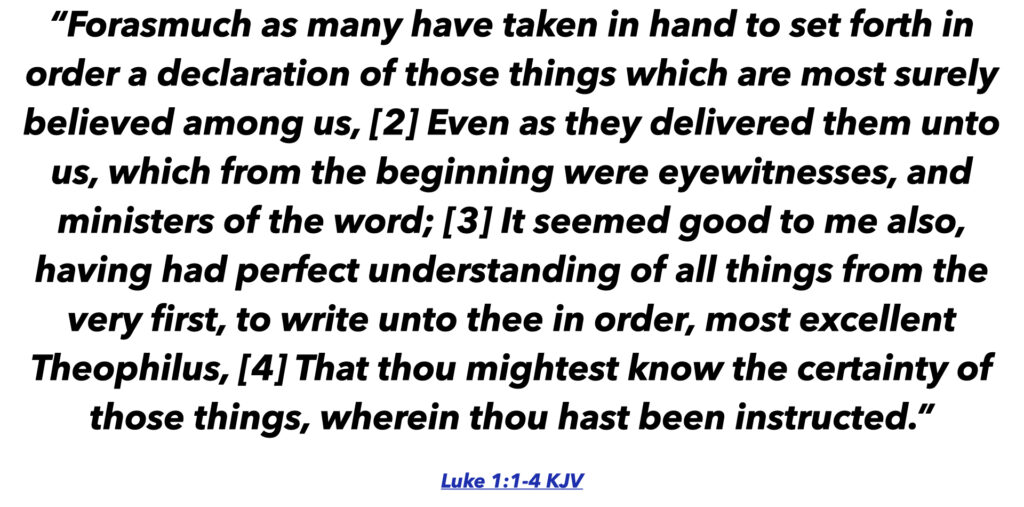
“forasmuch as many have taken in hand to set forth in order a declaration of those things which are most surely believed among us, even as they delivered them unto us, which from the beginning were eyewitnesses and ministers of the word; it seemed good to me also, having had perfect understanding of all things from the very first, to write unto thee in order, most excellent Theophilus, that thou mightest know the certainty of those things, wherein thou has been instructed.
Let’s now begin to break down some of the key nuggets.
Luke Begins Destroying Doubts
Luke 1:1-4 is already destroying doubts and deflating some dodgy doctrine.
The first thing I want to outline is,
when you think about how Luke starts his Gospel account,
it’s very different from the other Gospel accounts.
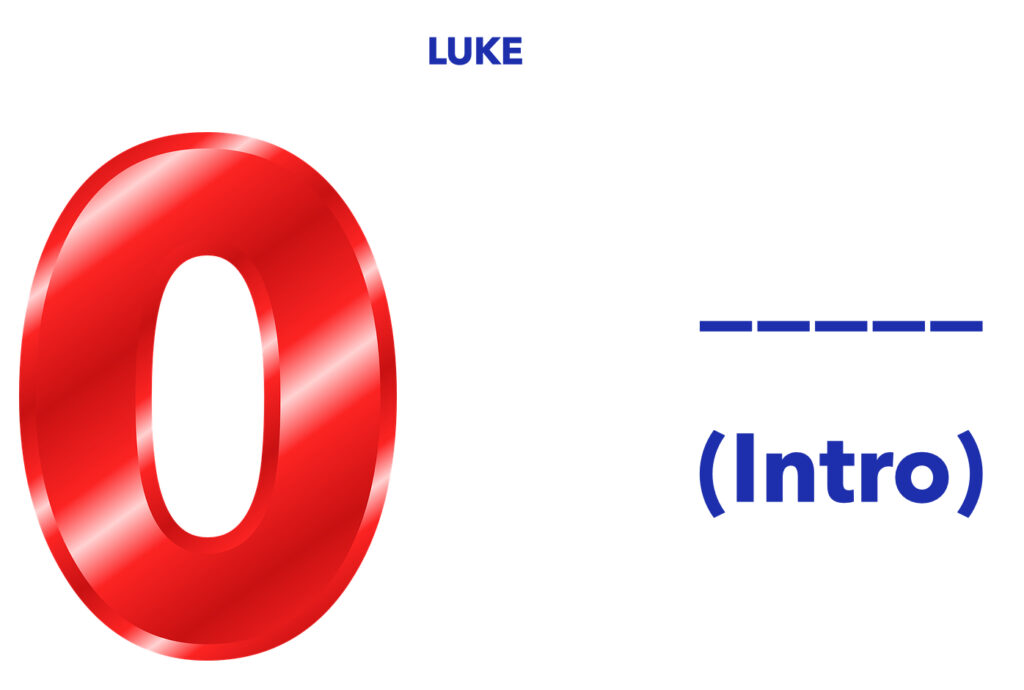
When you read Matthew’s Gospel account,
he starts by pointing back to Genesis.
He does this, to begin to prove the case Jesus is the Messiah.
This is what you see when you read the opening of Matthew’s Gospel account.
When you read through Mark’s Gospel account,
He immediately takes you back to the prophets.
He’s taking you back to Isaiah, to Malachi in the Old Testament.
Because he’s trying to present Jesus to you, as the Son of God!
When you read John’s Gospel account,
he immediately takes you back to Genesis.
He’s showcasing how Jesus is the creator of the heavens and the earth.
All three of them are taking you back to the Old Testament in one-way, shape, or form.
But as we just saw in two different translations,
Luke’s Gospel account doesn’t take you back in his introduction to anything from the Old Testament.
And he’s not presenting Jesus to you in any way.
Luke’s Gospel Is Different
In his introduction, he’s just giving you an intro.
That’s going to be powerful, because he’s clearly showcasing to you, he has a different angle.
So when you look at the four pictures we get in our four Gospel accounts,
three of them (75 percent of them) take you back to the Old Testament immediately.
Luke doesn’t immediately take you back to the Old Testament.
We’ll talk about some reasons why later on.
But he’s showing you his agenda from the beginning,
which is clearly different in some ways from the other three Gospel writers.
Luke will go on after his prologue,
to talk about Old Testament passages like Chronicles.
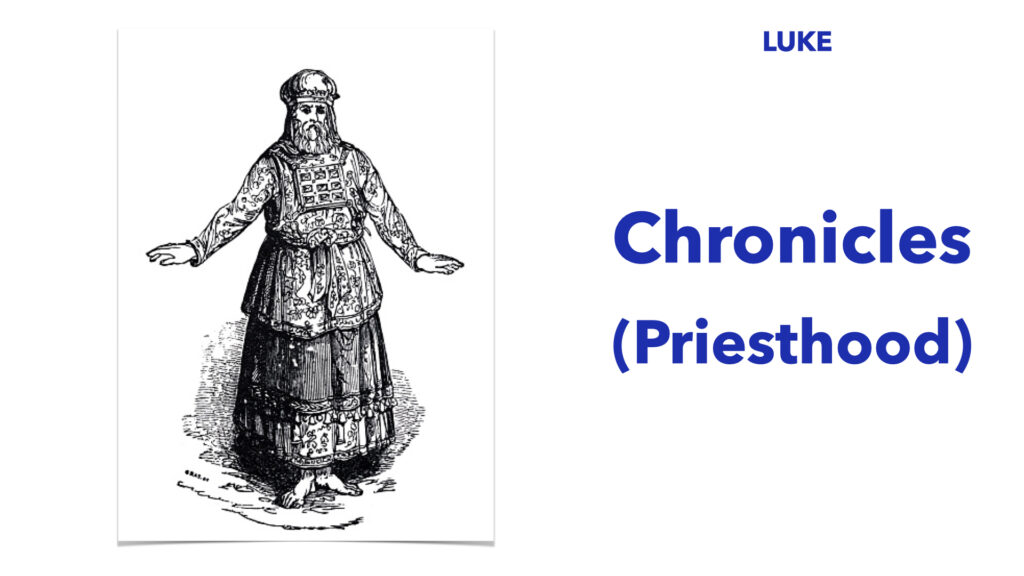
(We’ll discuss this in the next session a little bit).
The Prologue
I want to show you reading those verses is really the tip of the iceberg.
There are so much deeper layers to Luke’s prologue
which I’ll just give you a little taste.
Let’s go a little bit under the water.
I brought this out a little bit in the first session.
Luke Was Educated
I spoke about how Luke was an educated individual.
And one of the things I spoke about was how Luke’s Gospel account began in a very similar way to a man of medicine from history, Hippocrates. [4]Hippocrates. De Prisca Medicina
Hippocrates had a treaty’s hundreds of years before the Gospel of Luke.
And I talked about how some people look at stuff like this,
and say this is an indication, not only was Luke educated,
but also collaborates the scripture Luke was a medical doctor.
The Greek word “epecheirēsan”, which is a technical term that highlights Luke’s education.
this is one of the multiple words we see in Greek.
Greek showcases Luke wasn’t some dummy,
he was an educated person.
The scripture talked about how he was a doctor,
history talks about how he was a doctor as I talked about in the previous article.
And his examples like this, showcased he had familiarity with medical language.
I’ll bring that out more and more
as we go through his Gospel account,
but let’s continue.
That’s just the tip of the iceberg!

Luke 1:1 – Getting Rid of The Doubts
The next thing I want to focus on in Luke’s prologue is
he’s already trying to get rid of the doubts
many Christians may have today,
because he’s highlighting very truthfully,
there were many people who spoke about Christ.
Notice how in verse one, he says,
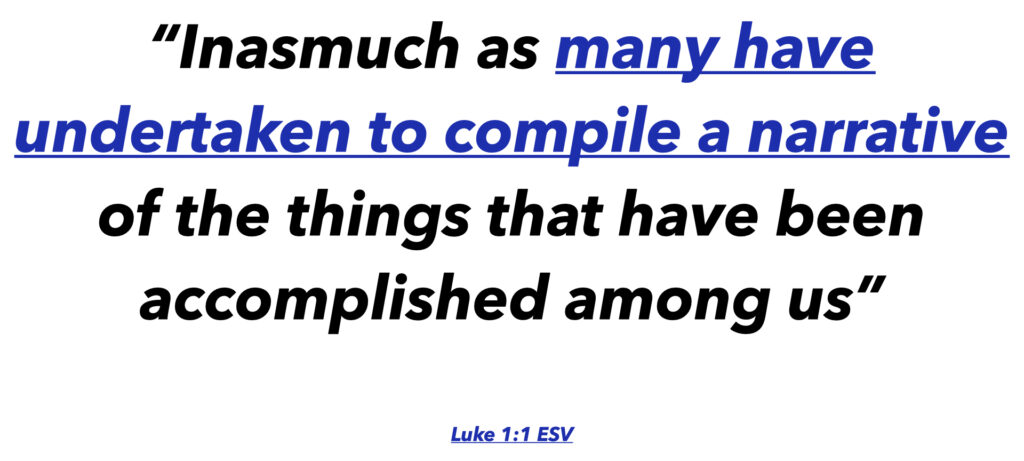
“Inasmuch as many have undertaken to compile a narrative of the things that have been accomplished among us”
Luke wasn’t the only person writing about Jesus Christ.
And the things that happened among the early disciples.
Luke tells you right from the get-go.
He doesn’t have to tell you this,
but it’s something he’s sharing honestly.
This should already begin to build your confidence.
Questions are always going to be vital,
because when you read the scriptures
you should always be asking questions.
One question you may be thinking is:
how many people wrote about the life of Christ?
There Are Other Write-ups
Some people maybe like,
wait, Israel, so you’re telling me there are other people that wrote about things that are in the scripture?
but it’s not scripture?!
or we don’t have it?
And that shouldn’t be a surprise. As you read through the Old Testament, here are just some examples of different books.
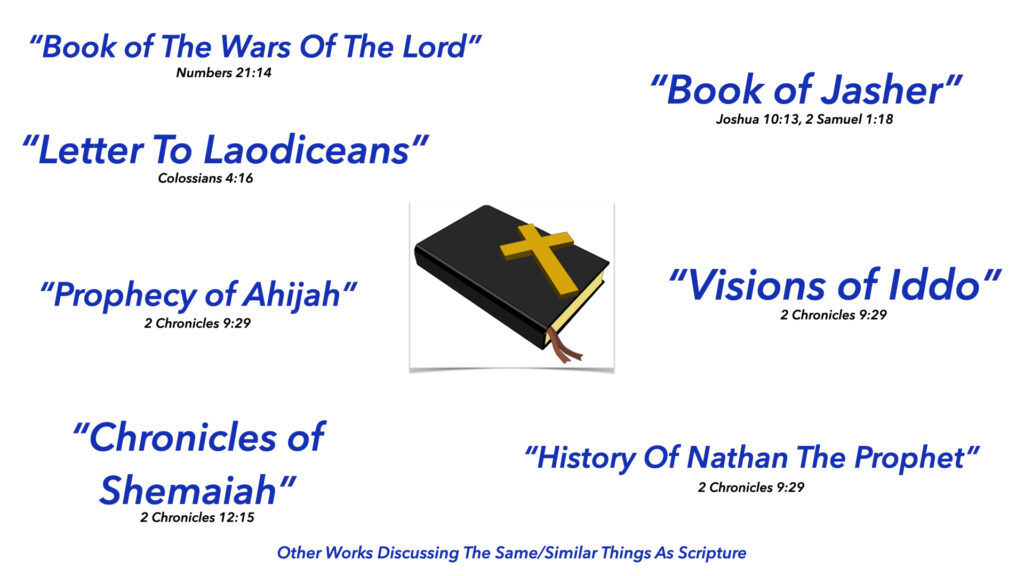
The book of the wars of the Lord (Numbers 21:14).
The book of Jasher (Joshua 10:13, 2 Samuel 1:18).
Different writings in the Old Testament,
New Testament,
as well as different prophecies.
Different chronicles,
different histories,
different visions,
which speak about the same thing which may be in scripture
but we don’t have today.
This may not even be scripture,
This isn’t scripture, but it’s still speaking about the same things.
Even though Luke is telling you quite clearly many people may have spoken about this,
it doesn’t mean, just because you spoke about Jesus it was scripture.
And you can liken it to a sporting event like a boxing match,
or a basketball game.

You may have the main outlet doing coverage.
That’s how we can liken scripture discussing matters,
but other writings mentioning the same stuff.
The Bible never says, the Bible is the only document in history that covers certain events.
But there are obviously things the Bible covers and nobody else covers.
Luke Wasn’t The First
He wasn’t the first either.
Luke says quite clearly and shamelessly,
he wasn’t the first to write.
“Inasmuch as many have undertaken to compile a narrative of the things that have been accomplished among us”
There were many people who spoke about Christ (both written and oral).
And many people wanted to compile a narrative.
About how many? We don’t know,
we can talk about some in a moment.
But Luke is revealing many people tried to compile a narrative.
Dodgy Doctrine
I spoke about this in the first session,
and presented multiple arguments.
We can build a strong case the Gospel of Luke was written by 65 AD.
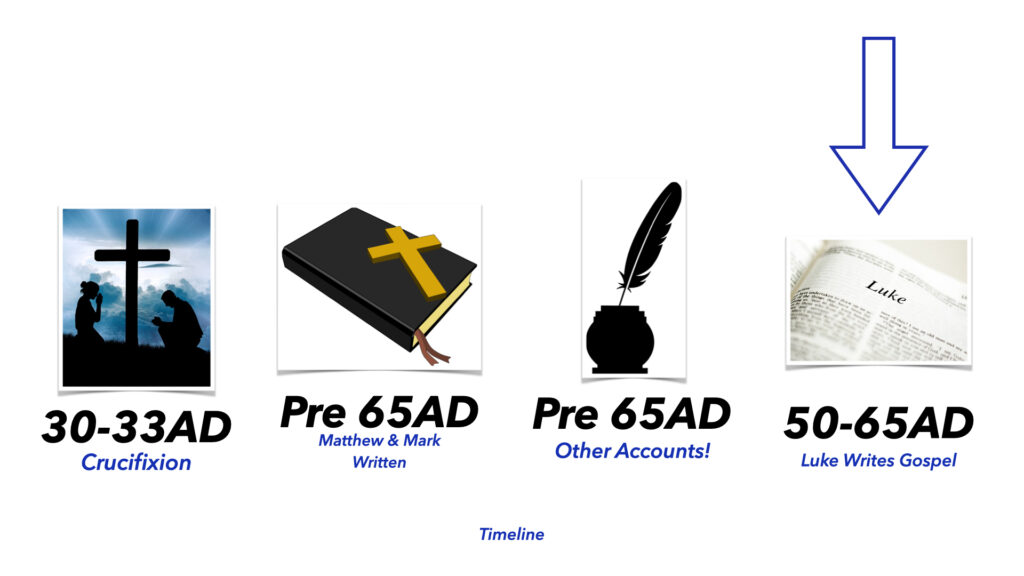
You can even make an argument the Gospel of Luke was written before 50 AD,
but that was not my aim in the previous session. My main point was you can believe scripturally & rationally, it was written before 65 AD.
Now, based on what we’ve just covered in regards to verse 1 of Luke’s Gospel account, there will obviously be other accounts written no later than before 65 AD.
For example, in the worst-case scenario of this case, Luke is written at 65 AD.
But anyway, these people who wrote before Luke, who spoke before Luke, had to be written before Luke for him to mention it.
We know about Matthew,
we know about Mark.

The crucifixion around 33 AD is obviously where all of this stuff begins.
We’re talking about between 33 AD and 65 AD.
There were multiple accounts about Jesus’s life. We have Luke, Mark, and Matthew that we hold to as scripture today as Christians.
But that’s the window in which we’re looking at, based on what Luke’s saying now.
Not Fairly Tales
We all know as children we heard stories like the Three Billy Goat’s Gruff.

Luke shuts this sort of comparison down from the beginning.
Luke isn’t writing some fanciful tale.
And this is not his claim.
He claims the opposite!
Luke wasn’t writing a story,
he was writing truthful history.
And we can see when we look at verse one again,
*notice how we’re still in the first verse*
and there are so many different dynamics to this intro,
which is deflating the doubts that Christians
may have based on a lot of the stuff we hear today.
He says,

“inasmuch as many have undertaken to compile a narrative of the things that have been accomplished among us“
So, he’s not saying look, this was in some far-away land,
he’s not saying this was hundreds of years ago,
No!
These things were among us, were fulfilled among us, and believed among us!
We’re talking about the same lifetime,
the same period of time Luke is speaking.
He goes even further to build your confidence.

When Luke goes out of his way to not point back to the Old Testament, not because he didn’t know any of this stuff.
He says he spoke with eyewitnesses, and they shared some information with him.
Notice what he says as we now move into verse 2 of his prologue.
“Inasmuch as many have undertaken to compile a narrative of the things that have been accomplished among us, just as those who from the beginning were eyewitnesses and ministers of the word“
The closest people.
Eyewitnesses, the ministers have delivered them unto us.
So what Luke is sharing comes from eyewitnesses and ministers of the word,
who shared those things with him.
He’s now relaying it to us.
So when you read through Luke’s Gospel account,
that’s the claim he’s making,
he’s claiming to have this on the authority of people
who were closest to the situation,
the closest to Christ. These were the kind of people the Holy Spirit inspired to write Holy Scripture.
Luke is showcasing he was like a detective,
like a reporter.
He went to the crime scenes,
he’s speaking with these people and trying to get information
to present a case,
to destroy the doubts people will try to get you to have.
And when he writes this in verse 3 of his prologue,
‘it seemed good to me also, having followed all things closely for some time past“.
So this wasn’t something Luke just stumbled across,
he leaned into it,
and studied it like I just showed you.

Not only did he study for himself,
he studied clearly, because he wanted to give
an orderly account of what happened.

And this is where he’s differentiating his Gospel from the many spoken about earlier.
Even though he wasn’t necessarily speaking about them in a negative light,
notice what he says in verse three of the prologue. He says,
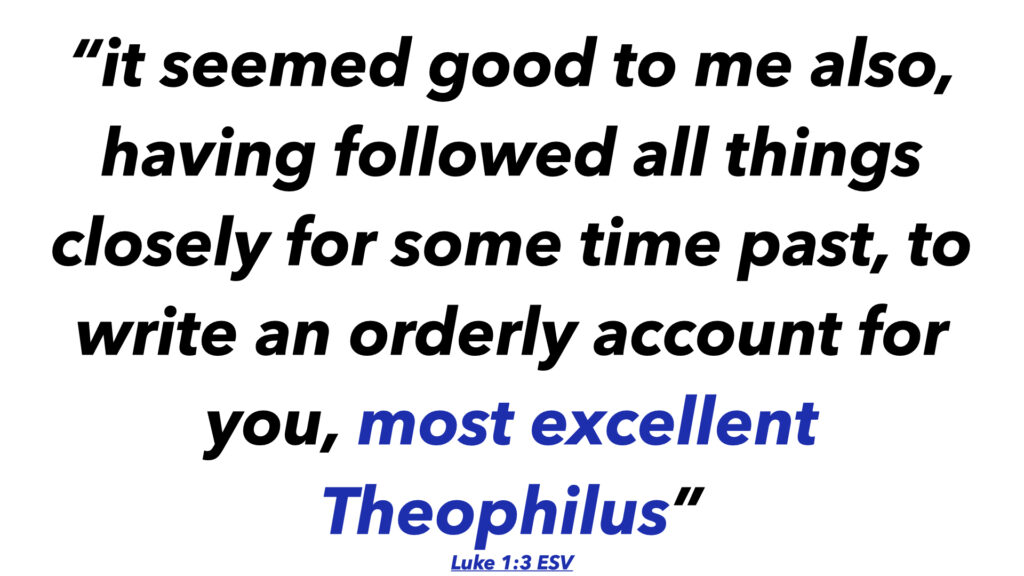
“it seemed good to me also, having followed all things closely for some time past, to write an orderly account for you, most excellent Theophilus“
I’ve taken my time to present this to you in a way that makes the most sense.
What he’s talking about, is quite clearly seen when you read through Luke’s Gospel account.
He covers a wide timeline in the ministry of Christ.
The widest of all four Gospel accounts.
He starts earlier than any other Gospel, because he starts with the beginning.
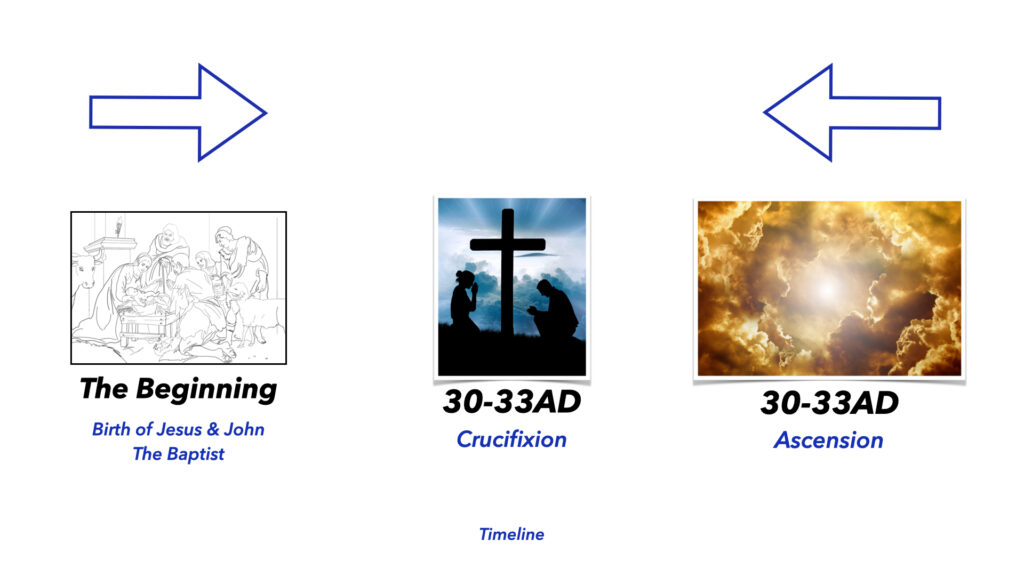
Luke mentions the birth of Jesus, like Matthew,
But starts with the birth of John the Baptist
(which is earlier than even Matthew’s Gospel account).
And he ends later than any of the Gospels,
because he ends, not with the crucifixion,
not with the great commission,
he ends with the Ascension of Christ.
He covers the widest timeline in his Gospel account,
and that’s what he’s prepared you for from the beginning. He wanted to give you an orderly account,
this is how it started,
this is how it finished,
and it sets you up for his next work,
Acts.
How Luke Deflates Dodgy Doctrine
Remember, in this same prologue, Luke strengthens your faith, but also deflates dodgy doctrine. Dodgy doctrine some Black Hebrew Israelite groups preach, like only Israelites can be saved.
Luke begins to shut that down.
And will continue to shut that down throughout the Gospel
So cast your mind now to this story.
The funny thing is, this teaching was ready to go last week,
I actually anticipated delivering this last week.
Everything was ready in regard to how we’re going to deal with doubt
and deflate dodgy doctrine.
But I felt in my spirit not to do this last week.
Debunking Misleading Teachings
Saturday morning I woke up and I see this particular comment.
This comment said,

“/ have a Hebrew Israelite stating that many people aren’t authorize[d] to teach according to the word. Especially when the most High only authorized Israel to teach his Word. Is this true? Do you have a video that speaks to this?
Now, obviously, this post speaks to this.
I’ve got multiple videos debunking, and destroying these sorts of false Hebrew Israelite teachings.
And it was ready last week, before this comment even came in.
But this helps amplify what we’re dealing with in regard to today’s post.
Because there are people hearing these sorts of things.
This is not some trivial thing.
This is clearly being spread across the internet, wide and far to whoever will hear this nonsense.
Remember how I said the four Gospel accounts differ in regard to the introduction.

Luke is noticeably different from the other Gospel accounts, because he doesn’t take you back to the Old Testament immediately.
He does not present Christ in any shape or form at all in the prologue.
And one of the reasons brought out from that introduction,
and other parts of the scripture, is Luke was a gentile.
So the funny thing is, as Luke is going to present to you clearly, and I’ll bring this out over and over again…This is a salvation message, for Israelites yes, but also for the gentile nations, the non-Israelites.
TThis is a Gospel account which is written by a gentile,
it totally obliterates the Israelite-only doctrine.
Because the question you have to ask yourself is, if salvation isn’t for non-Israelites, why is God allowing a non-Israelite to write Holy scripture?
That’s a dilemma these Hebrew Israelite groups can’t get out of, in any logical way.
Luke – A Gentile?
I spoke about this a little in part one.
He says in verse three,
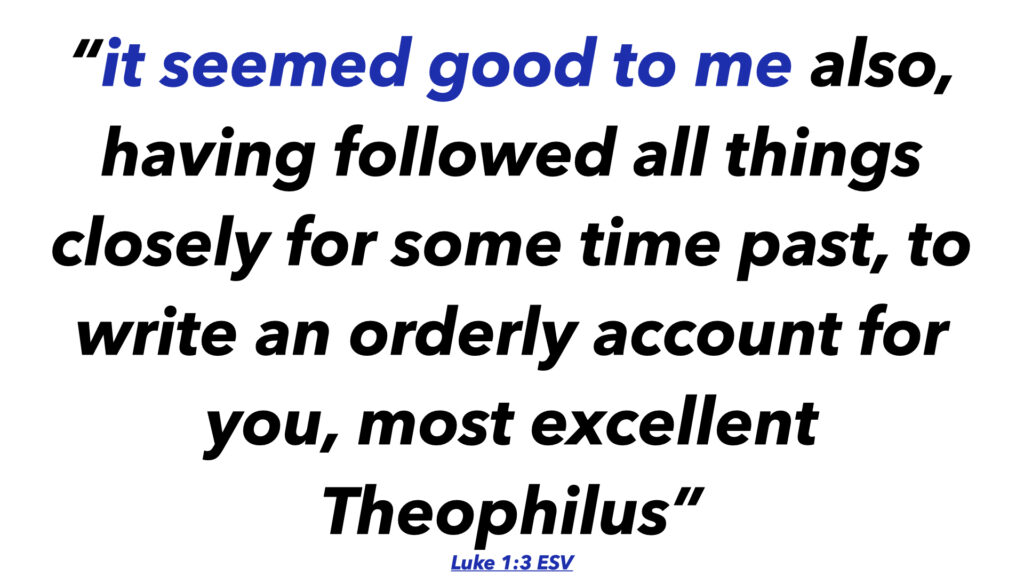
“it seemed good to him also, having followed all things closely for some time past, to write an orderly account for you, most excellent Theophilus.“
Luke is saying it seemed good to him,
inspired by the Holy Spirit,
inspiring this gentile.
The scriptures in the New Testament, highlight Luke was a gentile,
and history corroborates this.
*All of this was covered in the introduction.*
And he’s saying boldly it seemed good to me also, to write this account down.
This shouldn’t be a surprise because we see something like this, in the Old Testament, which is almost like a verbatim quote.
Look at what it says here, which I’ve highlighted in the book of Daniel.
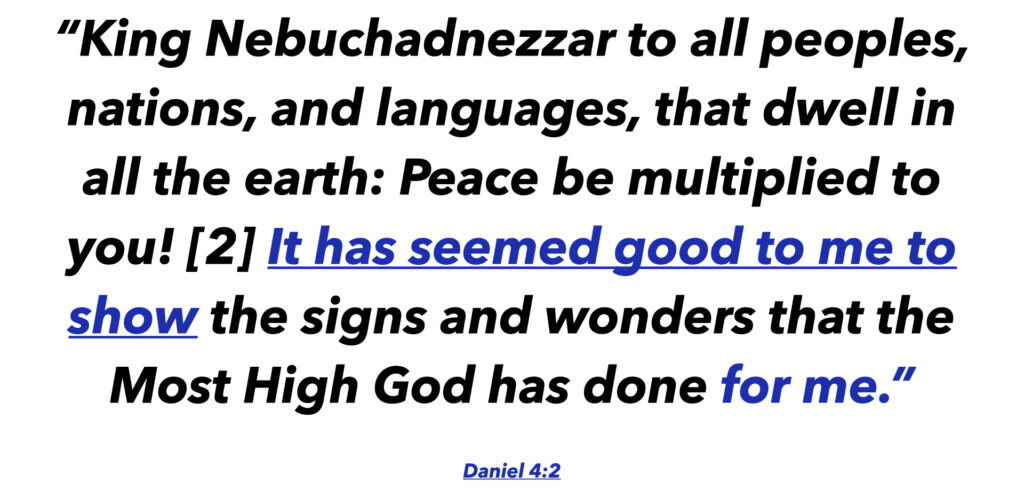
A third of the way through the book of Daniel, we get a piece of scripture from a gentile king…The king of Babylon, Nebuchadnezzar.
Notice what Nebuchadnezzar says, (just like Luke says) in his Gospel account.
“King Nebuchadnezzar to all peoples, nations, and languages, that dwell in all the earth: Peace be multiplied to you! It has seemed good to me to show the signs and wonders that the Most High God has done for me.“
The whole of Daniel chapter 4 is written by king Nebuchadnezzar,
a Non-Israelite, gentile king of Babylon,
who’s a believer in God.
And tongue in cheek, he’s proclaiming the Gospel to all of the earth!
King Nebuchadnezzar is showcasing how God has transformed his life.
So when we read in Luke’s prologue, he’s talking about “it seems good to him“
Is it a surprise we see something so similar, by a gentile in the Old Testament?
He’s already deflating dodgy doctrine, like Israelite-only, in the first four verses. But it gets better, as we think about who Theophilus is.

In the first couple of verses in his Gospel account, this adds more fuel to the fire.
Notice what Luke writes in verse three,
“it seemed good to him also, having followed all things closely for some time past, to write an orderly account for you, most excellent Theophilus.“.
This Gospel was written to Theophilus
Who is Theophilus?
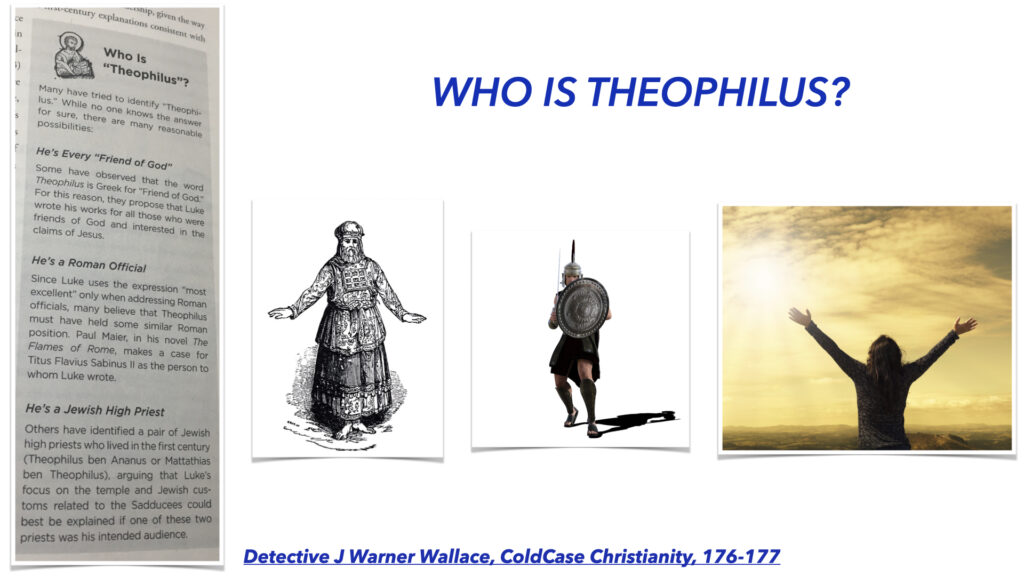
I spoke about this in session one.
There’s no definitive answer for us who Theophilus is, because he doesn’t say which Theophilus he’s writing to.
Some think he did this purposely to be ambiguous,
but either way, notice, I like the way J Warner Wallace, (detective J. Wallace) did it
in the book Cold Case Christianity. [5]J Warner Wallace. ColdCase Christianity. Pg. 176-177
If you just want some quick insights,
he provides a snapshot in his book.
You can read more technical books, but he gives you three main culprits.
I’ll tell you now, it doesn’t help the Israelite-only doctrine.

One of the examples is, Theophilus was a high priest,
or a Jewish individual from the first century.
If I’m honest, I like some of the argumentation.
But others make the case Luke was writing to Theophilus, a Roman official of some sort,
especially someone of high rank. Luke describes Theophilus in a way he does, for only Roman officials in Luke & Acts.
To be honest, although I like the high priest argument, I actually think the Roman official makes the most sense.
And is probably truest to evidence we have.
But there are some who say Luke was referring to any lover or any believer in God,
because Theophilus means, a friend/lover of God.
These are the three main arguments,
but two-thirds of those are gentiles.
The roman official most likely would be a gentile Theophilus, based on those arguments.
And if Luke is writing to all friends and believers in God,
we know he’s including non-Israelites, based on how his Gospel presents this so nicely.
So, it gets even worse for these sorts of Hebrew-Israelite groups,
who try to claim Luke taught, or that salvation is for Israel only.
But it gets worse.
This puts these Hebrew-Israelites in a dilemma.
Believing a view such as this, puts you in a position where, you’re going to have to start belittling Luke’s writings.
But the problem is,
Luke claims in his prologue, he had a perfect understanding.
Notice what he says in verse three.
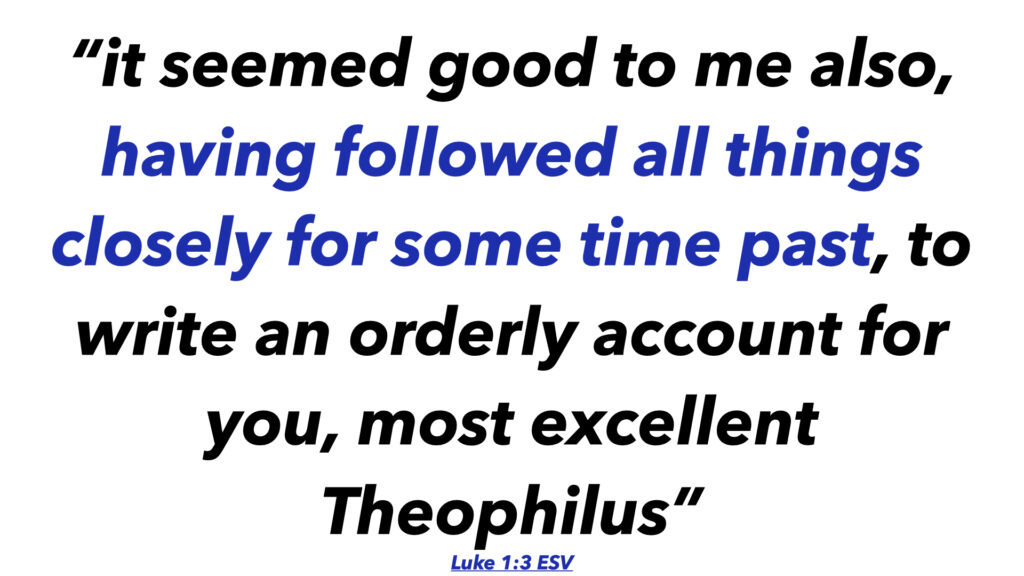
“it seemed good to me also, having followed all things closely for some time past, to write an orderly account for you, most excellent Theophilus”.
So if a Hebrew Israelite wants you to believe, “Luke was some gentile (or even an Israelite preaching salvation for all), who didn’t really know his stuff.”
It totally debunks what Luke’s saying.
And the fact is, that totally goes against everything I’ve shown you, from his prologue alone. I already debunked that sort of argumentation.
But Imagine relying on such nonsensical argumentation. You could not trust the scripture…And this is exactly what every cult wants.
Because they now become the arbiter of truth.
*Enter false doctrine…Which eventually results in cult-status.*
Remember the story I told you at the start of this post about Sir William Ramsey. What did he do?
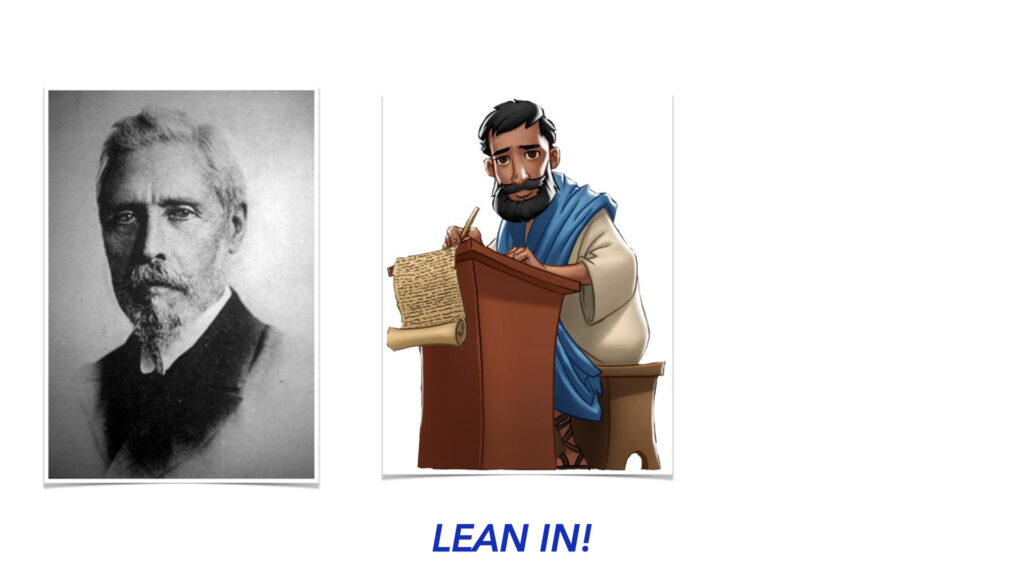
He leaned in!
He had beliefs about Luke, the Bible,
and he didn’t sit down,
he leaned into him
and he became stronger!
Because that’s what happens when you lean into your doubts,
about the things you believe in,
you become stronger.
What did Luke do?
When Luke was writing scripture, in his prologue, he was already telling you
“I leaned in! That’s how I’ve got a perfect understanding to share with you Theophilus
I leaned in. I investigated this stuff,
and it made me stronger, to a point where I can confirm to you Theophilus, the things that I’m writing.
What Did Luke Want Theophilus To Do?
I want you to read this account, Theophilus,
so you can lean in,
and see what I’m saying,
and build the faith you have in Jesus.
and be confident in it.
What do I do anytime I’ve had doubts about my faith?
I lean in, I lean into those doubts,
I lean into things I’m confident in.
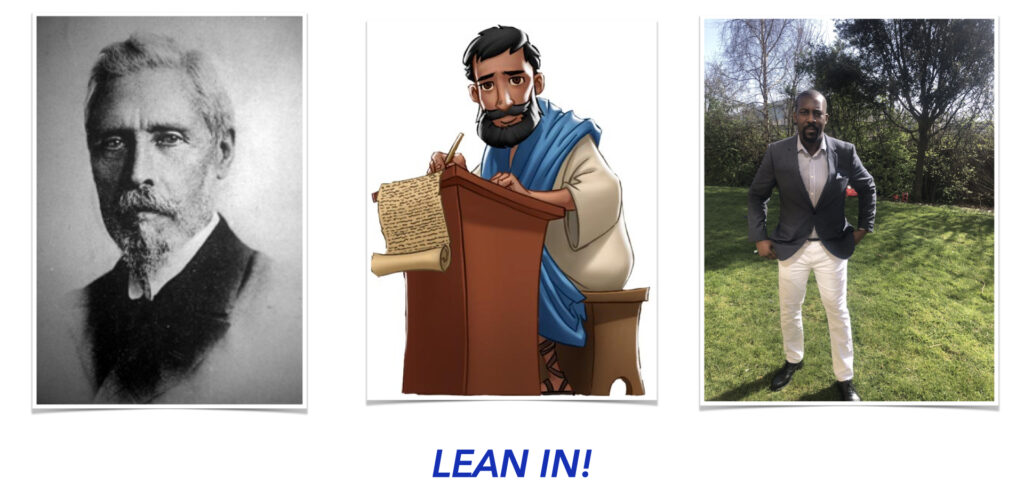
Why?
Because I know it will make me stronger.
Even if you think about this series through Luke.
I’ve spoken about, in different contexts already.
This is one of the hardest things I’ve had to do.
And there are different times I’ve said to myself,
This is too hard,
I don’t know if I can do this.
Because there are books you have to read,
Thousand-page books, hundreds,
Even if you include books that go against the things we believe,
and I said to myself, you know what, can I actually do this?
I said,
I’m going lean into this,
and I’m going to make them the best I’ve ever done.
Why? Because I know as I lean in more deeply,
I’m going to get even stronger.
What do you think the question I have for you is?
Are you really leaning in?
Ask yourself that question.
Are you really leaning in right now?
When you lean in,
when you study these things more,
you may be in doubt when you hear some of the quotes from atheists.
But I shared with you earlier,
Luke in his prologue, wants you to have certainty about the things you believe.
He wants you to have confidence!
What does he say in verse 4?

He says, I’m writing this to you, most excellent Theophilus.
“that you may have certainty concerning the things you have been taught”.
You see,
We’ve all been taught, but have you made it your own?
I’m giving you some breadcrumbs today, things you can chase-down deeper for yourself.
I’m showing you some of this stuff,
not only to build your confidence,
We’re dealing with doubts that will come up.
And I’m showing you how Luke’s opening to his Gospel is already deflating some of the dodgiest doctrines we see today.
But some of the dodgiest doctrine, which is confidently espoused by people,
who think they’re actually in the truth.
When in fact, they’re blinding themselves to the truth of the Gospel
Luke wants you to have certainty.

So when you’re doubtful,
reading Luke’s Gospel account is something you can do.
You’ve arrived at your destination now.
As we arrive at our destination, I’ve walked you through the five Ds
We’ve Dealt with Doubts
we’ve Deflated the Dodgy Doctrine.
We’ve looked at Luke’s prologue in his Gospel account.
Destroying Doubt – A Recap
Let’s recap and discover again how Luke’s prologue begins, and will start to showcase
the five D’s.
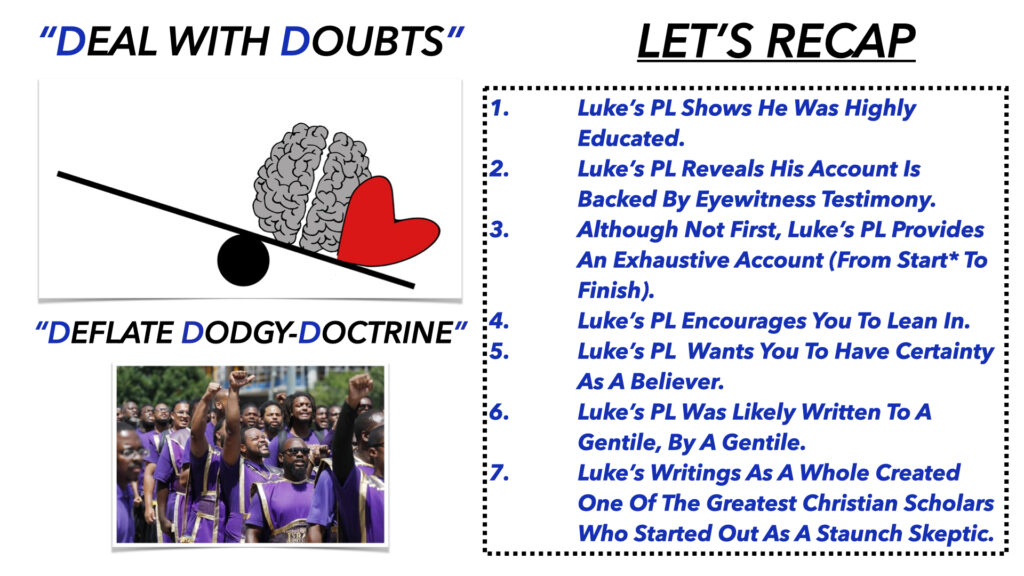
1. In his prologue he defeats dodgy doctrine.
Luke’s prologue shows he was highly educated. We spoke about one of many words in Greek Luke uses to show his pedigree.
2. Luke’s prologue as reveals his account is based on eyewitness testimony.
He wasn’t somebody far away after the time, he was in the time period, and speaking to people in that time period also.
Although not first as he said truthfully,
3. Luke’s prologue provides an exhaustive account.
From start to finish, he spoke about how it covers the largest timeline.
4. Luke’s prologue encourages you to lean in.
Have certainty, Theophilus.
You’re going to have certainty based on what I’m writing,
and that’s what Luke wants you to have.
That’s what I want you to have.
And that’s the basis, the main goal of these posts.
(especially today’s session).
5. Luke’s prologue wants you to have certainty as a believer.
There are things you may doubt in your faith,
and most likely reading Luke’s Gospel account will deal with many of those doubts.
6. Luke’s prologue was written by a gentile.
This totally obliterates Israelite-only doctrine.
7. Luke’s prologue, and Luke’s writings as a whole, created one of the greatest Christian scholars ever, William Ramsey (who started out as a staunch skeptic).
So when you think about part one,
when you think about this post,
we’ve only looked at four verses.
And Luke has already made a number of claims.
He’s already said things which are dealing with the doubts you may have.
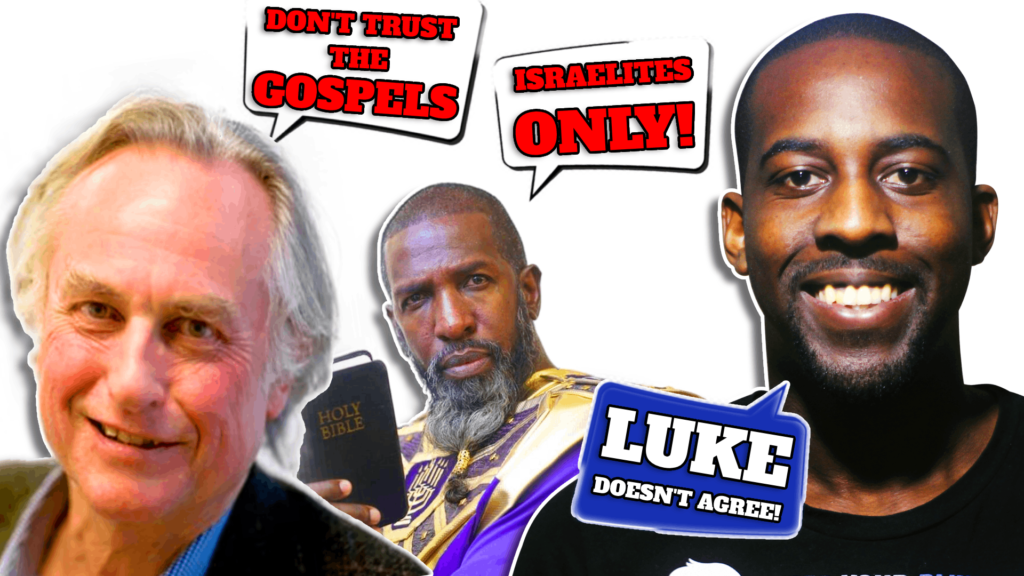
Luke will deal with doubts you may have, as we continue through his Gospel account.
What do you think is going to happen as we continue through this series?
It’s only going to get better brothers and sisters in Christ.
And I want you, if you’re not doing this already,
to lean in deeper into your faith.
Because it will only make you stronger.
On that note, brothers and sisters in Christ,
I’ll bless you ,and say see you soon.
Until next time.
God bless.
If you prefer to watch, here is the video:
God bless.
If you enjoyed reading this post, please share it with a friend. Remember, you can leave a comment below to share your thoughts on the lessons you learned in this post.


























Recent Comments